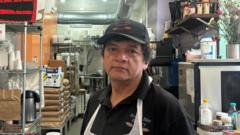In the midst of rising costs and a strained economy, American coffee lovers are feeling the pinch as cafés struggle with increasing prices on imported beans and other essentials.
The price for a cup of coffee in the U.S. is on the rise as new tariffs squeeze local cafe and bakery owners. Many businesses report that customers are pulling back on purchases of specialty drinks, as the cost of imported coffee beans continues to escalate. The U.S. is the second-largest importer of coffee globally, with sources primarily from Brazil and Colombia, according to the U.S. Department of Agriculture.
Amongst those affected is Jorge Prudencio, proprietor of Bread Bite Bakery in Washington, D.C., who mentioned that his supplier has already raised prices due to the tariffs that went into effect recently. To maintain financial viability, Prudencio stated he would have no choice but to raise prices for his customers.
"We're seeing a reduction in our customer base," said Kamal Mortada, manager of Au Lait café. Rising inflation has affected not only coffee prices but also other staple goods, with initial hikes occurring even before the tariff imposition. "We have less customers for coffee," Mortada explained, highlighting that many patrons now prefer purchasing plain coffee instead of more elaborate, pricier drinks.
Meanwhile, on the opposite coast, Jenny Ngo, owner of Telescope Coffee in San Francisco, waits anxiously for her coffee roaster to announce expected price increases for her Ethiopian and Guatemalan brews. Ngo also mentioned that her iced coffee cups have seen significant price spikes due to the tariffs affecting imports.
As the coffee sector grapples with rising expenses, other food staples like eggs are also becoming more costly—highlighting broader economic strains. Prudencio reported recent price increases for eggs at his bakery from $42 to over $100 per case within weeks, showcasing the overall inflationary trends impacting businesses today.
Joel Finkelstein of Qualia Coffee Roasters, a small enterprise in Washington D.C., fears a decline in sales due to these tariffs, adding his business has faced ongoing pricing pressures since Trump’s administration. As prices continue to rise, the future of coffee consumption in the U.S. hangs precariously in the balance.
The price for a cup of coffee in the U.S. is on the rise as new tariffs squeeze local cafe and bakery owners. Many businesses report that customers are pulling back on purchases of specialty drinks, as the cost of imported coffee beans continues to escalate. The U.S. is the second-largest importer of coffee globally, with sources primarily from Brazil and Colombia, according to the U.S. Department of Agriculture.
Amongst those affected is Jorge Prudencio, proprietor of Bread Bite Bakery in Washington, D.C., who mentioned that his supplier has already raised prices due to the tariffs that went into effect recently. To maintain financial viability, Prudencio stated he would have no choice but to raise prices for his customers.
"We're seeing a reduction in our customer base," said Kamal Mortada, manager of Au Lait café. Rising inflation has affected not only coffee prices but also other staple goods, with initial hikes occurring even before the tariff imposition. "We have less customers for coffee," Mortada explained, highlighting that many patrons now prefer purchasing plain coffee instead of more elaborate, pricier drinks.
Meanwhile, on the opposite coast, Jenny Ngo, owner of Telescope Coffee in San Francisco, waits anxiously for her coffee roaster to announce expected price increases for her Ethiopian and Guatemalan brews. Ngo also mentioned that her iced coffee cups have seen significant price spikes due to the tariffs affecting imports.
As the coffee sector grapples with rising expenses, other food staples like eggs are also becoming more costly—highlighting broader economic strains. Prudencio reported recent price increases for eggs at his bakery from $42 to over $100 per case within weeks, showcasing the overall inflationary trends impacting businesses today.
Joel Finkelstein of Qualia Coffee Roasters, a small enterprise in Washington D.C., fears a decline in sales due to these tariffs, adding his business has faced ongoing pricing pressures since Trump’s administration. As prices continue to rise, the future of coffee consumption in the U.S. hangs precariously in the balance.




















